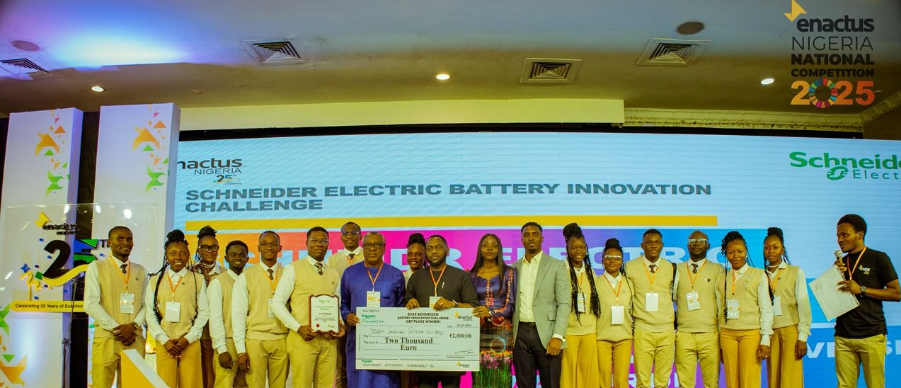French energy giant Schneider Electric is banking on Nigeria’s students to drive the country’s clean energy transition. Partnering with Enactus, a global non-profit, the company wrapped up the 2025 Enactus Nigeria National Competition in Lagos, where over 30 universities pitched solutions to some of the country’s toughest energy challenges.
The initiative is part of Schneider Electric’s global pledge to train one million young people by 2025, a goal the company is advancing through partnerships in education and entrepreneurship.
Joseph Sarwuan Tarka University, Makurdi, clinched the top prize in the Battery Innovation Challenge with its project ENERGIV, which converts plastic waste into carbon nanotubes to improve lithium-ion batteries, enhancing conductivity and extending battery life.
Ahmadu Bello University placed second with Cell Matrix, a smart battery management system that employs machine learning and embedded sensors to monitor battery health, detect anomalies and optimise charging cycles. Kaduna Polytechnic took third place with SmartVolt, an adaptive charging algorithm that uses real-time sensor data to reduce energy waste and extend battery lifespan.
The winners received cash prizes provided by Schneider Electric: €2,000 for first place, €1,500 for second and €1,000 for third.
JoSTUM doubles victory with Core Programme win. JoSTUM also won first place in the Enactus Core Programme with its project BettaCoal Energies, a social enterprise producing smokeless briquettes, an improved air-circulating stove for faster cooking, and biodegradable food containers for restaurants. The project seeks to reduce health risks from traditional cooking fuels, create employment in underserved communities and improve the profitability of small businesses.
As national champion, JoSTUM will represent Nigeria at the Enactus World Cup 2025 in Bangkok, Thailand, from September 25 to 28.
Country President of Schneider Electric Nigeria, Ajibola Akindele, MFR, said the contest highlights the company’s dedication to preparing young people for future challenges.
“Contributing our quota towards upskilling youths for the future is a key priority at Schneider. One of our core values is impact. Young people across communities are solving real problems, and our role is to support and empower them to do so on a bigger scale,” he said.
Access to Education Coordinator at Schneider Electric West Africa, Funmilayo Olakitan, noted that the initiative aligns with Schneider’s sustainability vision. “It was truly rewarding to see how forward-thinking these youths are, developing entrepreneurial and business skills that will equip them for the future. For Schneider Electric, this is more than a partnership; it directly contributes to our global goal to train one million youths by 2025, while also advancing SDGs 7, 11 and 12,” she said.
Country Director of Enactus Nigeria, Michael Ajayi, stated, “The energy, creativity, and commitment demonstrated by these students reflect the power of youth-led innovation in addressing real-world challenges.
“Through our partnership with Schneider Electric, we are not only building capacity but also inspiring a generation to take bold steps towards a more sustainable and equitable future.”














